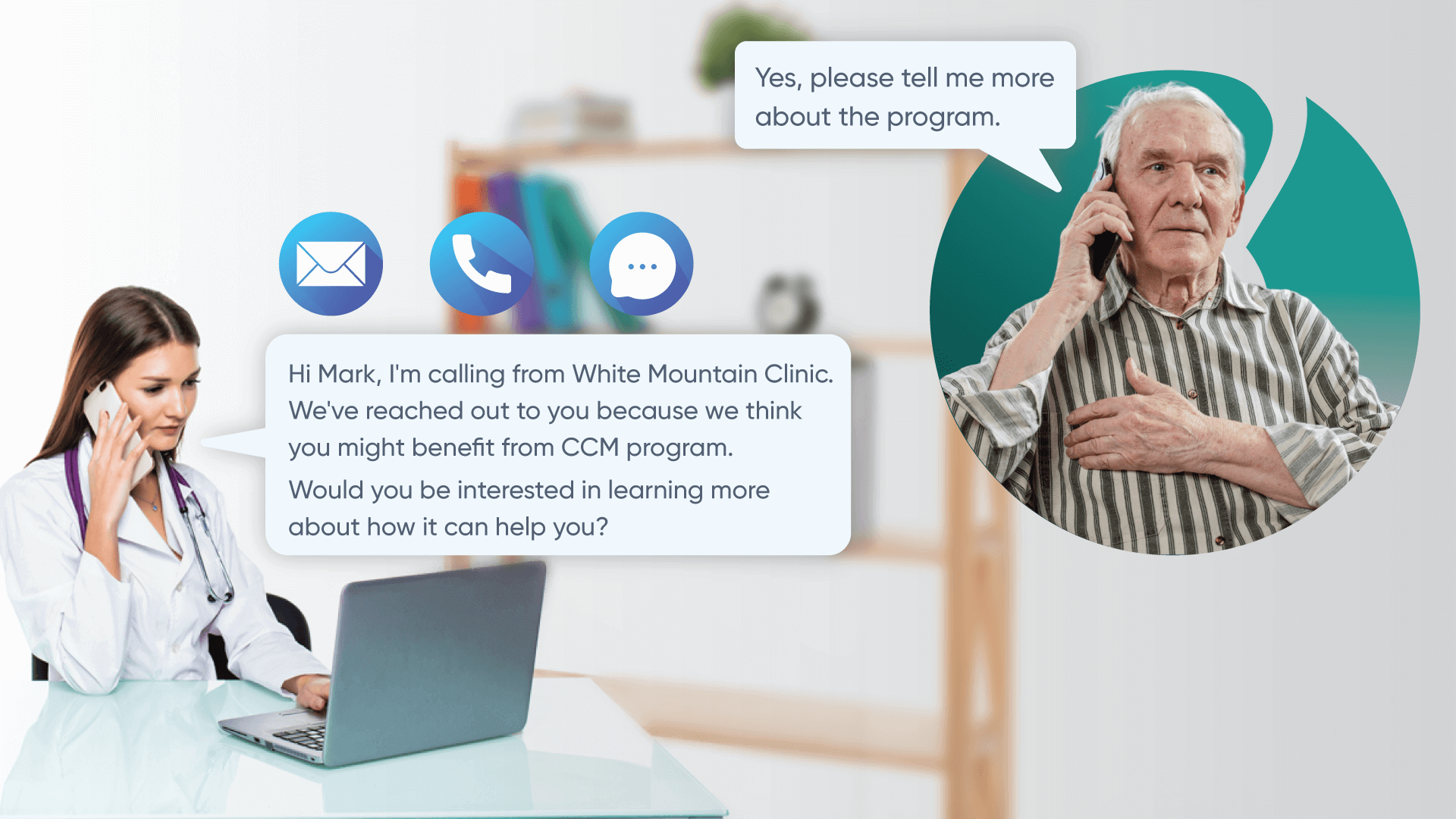Client Background
The client, a healthcare provider based in Georgia, USA, specializes in offering care coordination services to patients with multiple chronic diseases. In response to the rising prevalence of chronic diseases and readmissions, the client aims to initiate a new Chronic Care Management (CCM) software program. This program will provide patients with cost-free care coordination services to seek reimbursement through Medicare.
The client aimed to deliver effective and coordinated care services to the patients with their compassion, medical expertise, and use of digital technologies. The client provided services to more than 4000 patients enrolled in a chronic care management program with an opportunity to earn recurring revenue.
Business challenges
To manage patient records during care coordination services, the client was using a different EHR system from different providers. Due to the high patient population, there was a big challenge to create those patients in eCareMD and get them enrolled into CCM. Some of the challenges the client faced are:
1. Limited Accessibility Across Provider Groups
The client faced challenges in accessing patients from multiple provider groups efficiently, leading to fragmented workflows and reduced productivity. This lack of centralized patient management hindered the practice's ability to optimize care delivery and maximize reimbursement.
Along with that, the client was also looking for a platform for seamless care plan management and effectively increasing patient engagement with their care services.
2. Time-Consuming Enrollment Process
Enrolling patients in chronic care management (CCM) programs requires significant effort and time, impacting productivity and patient engagement. This manual process increased the risk of errors and delayed in program initiation, affecting the practice's ability to earn maximum reimbursement and deliver value-based care.
3. Low Patient Retention
Maintaining high patient engagement and retention in CCM programs was a challenge for the client. Limited communication channels and ineffective pre-enrollment communication strategies hindered the practice's ability to educate and engage patients, resulting in lower enrollment rates and reduced revenue potential.
4. Challenges in Care Plan Management
Managing personalized care plans for thousands of patients with multiple chronic conditions was complex and time-consuming for care managers.
5. Inefficient Storage and Access
Storing and accessing essential care documents, assessments, and ICD codes within the software was complicated for the client within the existing software. This lack of centralized document storage and accessibility impeded care coordination and decision-making, leading to inefficiencies and potential errors in care delivery.
Solution
To understand and fulfill the client’s requirements, our team of business analysts and subject matter experts took multiple calls and demonstrations. Upon understanding all requirements, Medarch Inc’s eCareMD software was implemented in the client’s practice. This implementation has increased the range of patient management and revenue for the client.
Solution Highlights
Medarch Inc.’s eCareMD software consists of various features that help the clients optimize the practice workflow and earn maximum reimbursement by providing value-based care. Some of the key solution highlights are:
1. Accessibility to More Patients from Multiple Provider Groups
The eCareMD software allows tenant providers to access patients from multiple assigned provider groups, enhancing productivity and enabling a centralized patient management system.
2. Bulk Invite with Digital Consent
It is essential to manage more patients and enroll them in the CCM program within the software. Sending invites to each patient one by one takes more time and requires more manual activities. The eCareMD software enabled the bulk invite functionality through which care providers could send invitations with consent forms to multiple patients at once and get them signed digitally.
3. Pre-enrollment Communication to Increase Patient Retention

To manage more patients and obtain their consent, it is important to interact with patients to explain and educate them about the benefits of getting enrolled in the program. The eCareMD software provides functionality to send an email, SMS, and call to the patient to increase engagement and get the patient enrolled in the program.
4. Patient-centric Personalized Care Plan
The software has the ability to manage thousands of patients with multiple chronic conditions. Hence, it becomes difficult for care managers to assign the care plan as per the health condition of the patient. The eCareMD software provides care providers with the ability to create, edit, and delete existing care plans.
5. Storing of Care Essentials and Documents
While managing more patients, it becomes difficult for the practices to keep the care plans, conditions, assessments, and ICD codes accessible and stored within the software for the delivery of quick care to the patients. The eCareMD software enables care providers to create and keep all mentioned entities within a library folder. It helped care providers easily access and customize all the entities essential for treatment and reduced confusion and manual work.
Value Delivered
1. Increased Reimbursement Amounts
With the use of eCareMD software, providers are able to manage more patients and, hence, were able to earn maximum reimbursement from insurance companies.
2. Streamlined Patient Enrollment
eCareMD's bulk invite feature simplified patient enrollment in the CCM program by allowing care providers to send invitations with digital consent forms to multiple patients simultaneously, reducing manual efforts and saving time.
3. Enhanced Patient Engagement
eCareMD's pre-enrollment communication feature enhances patient engagement by educating them about program benefits via email, SMS, and calls, thus increasing patient retention rate.
4. Improved Patient-centered Care
As the eCareMD software enables care providers to customize care plans as per the health status of patients, it results in improved health outcomes for the patient.
5. Quicker and accurate healthcare delivery
The library folder in the software helps in providing accurate and essential care and avoids confusion about storing healthcare entities required for treatment. It results in quicker care delivery and customization of entities such as care plans, assessments, conditions, and ICD codes as per the requirement.

